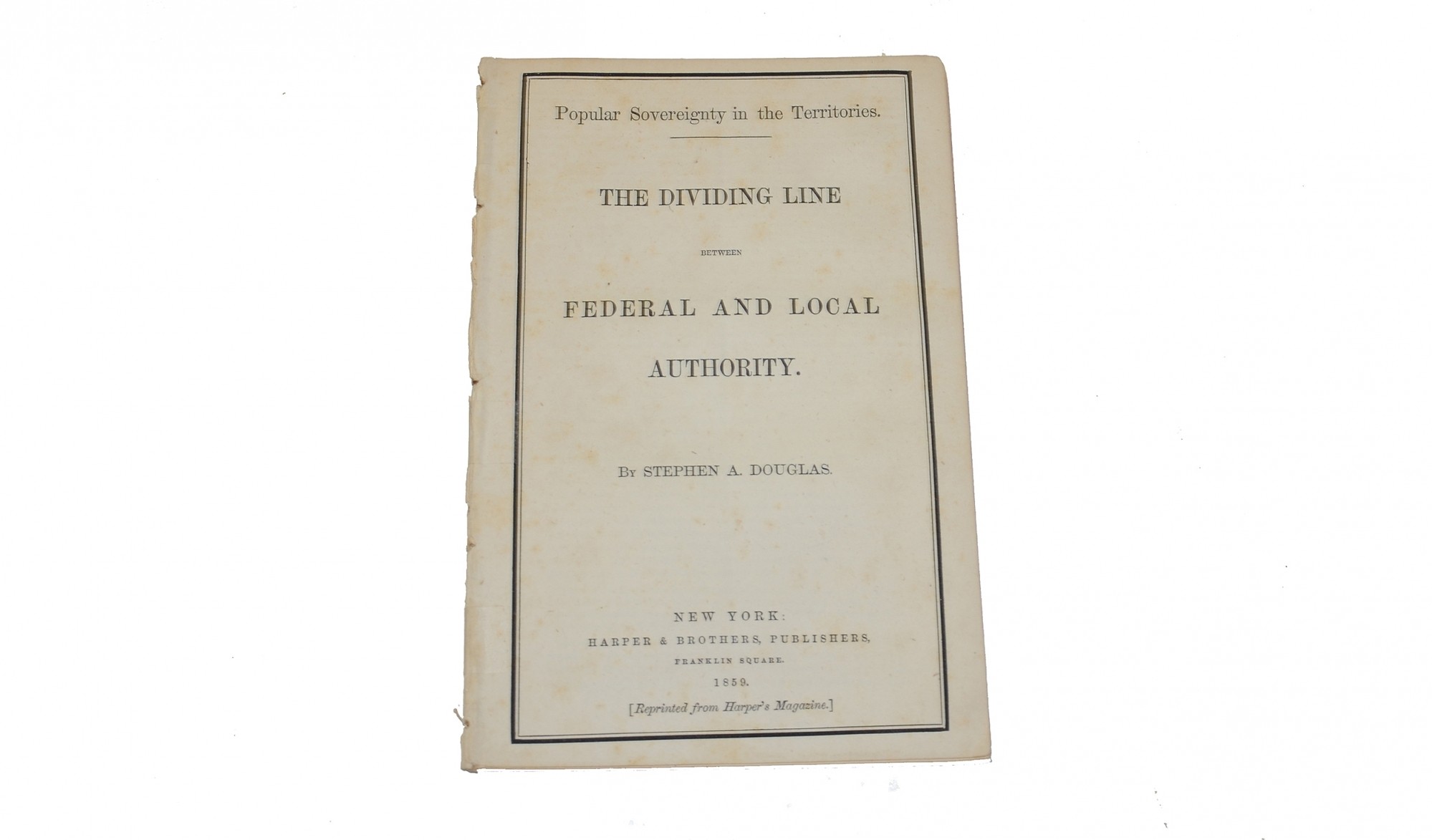site search
online catalog
THE DIVIDING LINE BETWEEN FEDERAL AND LOCAL AUTHORITY BY STEPHEN A. DOUGLAS

$100.00 SOLD
Quantity Available: None
Item Code: 337-244
This 1859 booklet is a re-printing of an article that appeared in Harper’s Magazine during that year 1859, and also in the New York Times, in the August 27, 1859 edition. 40 pp.; New York: Harper & Brothers, Publishers, 1859. Overall very fine condition, minor age yellowing throughout.
When slavery became a divisive political issue during the Mexican War and fearing that the issue might disrupt the Republic, U.S. Senator Stephen A. Douglass argued for the doctrine of popular sovereignty - the right of the people of a state or territory to decide the slavery question for themselves - as a Union-saving formula. He led the fight in Congress for the Compromise of 1850. Four years later, he incorporated the doctrine in the Kansas-Nebraska Act, thus repealing the Missouri Compromise of 1820. Douglas’s hopes for the country suffered a setback when the act aroused bitter opposition from northern antislavery elements, who eventually formed the Republican party.
During the 1850s, he continued to fight for popular sovereignty in Congress and in Illinois, where the state election campaign of 1858 was highlighted by his famous debates with Abraham Lincoln. He blamed the agitation over slavery on abolitionists in the North and disunionists in the South, trying to find a middle way that would preserve the Union. Slavery, he believed, must be treated impartially as a question of public policy, although he privately thought it was wrong and hoped it would be eliminated some day. At the same time, he saw in popular sovereignty an extension of local self-government and states’ rights and charged his opposition with seeking a consolidation of power on the national level that would restrict individual liberty and endanger the Union.
Douglas’s popularity waned as the party system foundered on the slavery question. Proposed as the Democratic candidate for president in 1852 and 1856, he did not win his party’s nomination until 1860, when it was too late. With his party hopelessly divided and a Republican elected to the presidency, he fought strenuously to hold the sections together with a compromise on the slavery issue, but to no avail. Following the firing on Fort Sumter in April 1861, he pledged his support to the northern cause and urged a vigorous prosecution of the war against the rebels. He died in June, however, worn out from his exertions and broken in spirit.
~~~~~~~~~~~~~~~~~~~~~~~~~~~~~~~~~~~
THIS ITEM, AS WITH ALL OTHER ITEMS AVAILABLE ON OUR WEB SITE,
MAY BE PURCHASED THROUGH OUR LAYAWAY PROGRAM.
FOR OUR POLICIES AND TERMS,
CLICK ON ‘CONTACT US’ AT THE TOP OF ANY PAGE ON THE SITE,
THEN ON ‘LAYAWAY POLICY’.
THANK YOU!
Inquire About THE DIVIDING LINE BETWEEN FEDERAL AND LOCAL AUTHORITY BY STEPHEN A. DOUGLAS
For inquiries, please email us at [email protected]
Most Popular
Historical Firearms Stolen From The National Civil War Museum In Harrisburg, Pa »
Theft From Gravesite Of Gen. John Reynolds »
Cavalry Carbine Sling Swivel »
Fine Condition Brass Infantry Bugle Insignia »
featured item
ELABORATE PRESENTATION GRADE OFFICER’S SWORD WITH SCABBARD INSCRIBED TO CAPTAIN AUGUSTUS HOELZLE OF BATTERY K ARTILLERY OF THE 1ST DIVISION OF THE NATIONAL GUARD OF THE STATE OF NEW YORK
This sword was probably sold by Schuyler, Hartley & Graham of New York. The pattern is pictured in their 1864 catalogue in figures 13 and 16. Rather than have a standard blade, the lightly curved 32 inch blade has "B.K." (Battery K) on the left… (870-447). Learn More »





